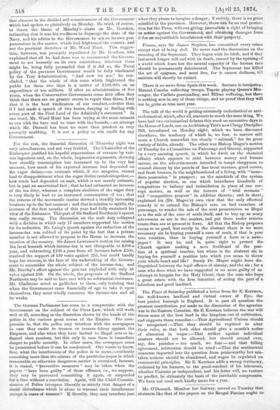The talk of the world is getting extremely ecclesiastical or
anti- ecclesiastical, which, after all, amounts to much the same thing. W e- have had two ecclesiastical debates this week on successive days in the House of Lords, one on Archbishop Tait's new Clergy Discipline Bill, introduced on Monday night, which we have discussed elsewhere, the tendency of which is, we fear, to narrow still more a Church somewhat too closely " cabined," for its great= varietyof faiths, already. The other was Bishop Magee's motion of Tuesday for a Committee on Patronage and Simony, supported by a very amusing speech, in which he dwelt on the chemical affinity which appears to exist between money and human- nature, on the advertisements intended to tempt clergymen to commit simony by the parade of fine trout streams, good covers, and fresh breezes, in the neighbourhood of a living, with "imme- diate possession" in prospect ; on the mischiefs of the system- of popular election, as one which introduces hundreds of temptations to bribery and intimidation in place of one cor- rupt motive, as well as the horrors of " trial sermons and " competitive prayers" in addition thereto ; and in shorty explained his (Dr. Magee's) own view that the only effectual remedy is to extend the Bishop's veto on bad exercises of patronage, to render the sale of the next presentation as illegal as is the sale of the cure of souls itself, and to buy up as many- advowsons as are in the market, and put them under stricter trusts than are at present in force. All that the Bishop proposes seems to us good, but surely in the abstract there is no more necessary sin in buying yourself a cure of souls, if that is your true vocation, than in buying yourself a farm or a news- paper ? It may be, and is, quite right to protect the Church against making a mere livelihood of the posi- tion of a spiritual teacher, but where is the abstract sin in buying for yourself a position into which you mean to throw your whole heart and life? Surely Dr. Magee might have dis- tinguished between the legal offence of simony, and the sin ; for a man who does what we have suggested is no more guilty of an attempt to bargain for the Holy Ghost, than the man who buys- a great estate with the firm intention of acting the part of a. laborious and good landlord.


































 Previous page
Previous page